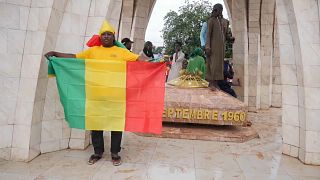Coup
Mali’s recent coup d'état is sounding an alarm to its continental neighbours as other African heads of state — before Keita, had already been coerced into resignation by their people.
The most recent situation was in Sudan, 11 April 2019. Omar al-Bashir, who had been in power for 30 years, was ejected by the army and placed in detention — following four months of civil protests. Consequently, a Transitional Military Council was established.
That same month, only a few days earlier, 2 April 2019, Abdelaziz Bouteflika — who was in power for 20 years in Algeria, resigned after a month of unprecedented protests against his run for a fifth term. Many Algerians, frustrated with the political system, continued to raise their voices for over a year until the arrival of the Covid-19 pandemic halted their activism.
South Africa's first Zulu president, Jacob Zuma who was sworn in May 2009 and made to resign, 14 February 2018 — under the threat of impeachment and pressure from his political party, the African National Congress (ANC). The party was eager to close the chapter on Zuma’s corruption scandals. Current president Cyril Ramaphosa succeeded him.
In Zimbabwe, Robert Mugabe, abandoned by his supporters and the army after 37 years in office, resigned 21 November 2017. This was amidst debates at the National Assembly over his dismissal. His former vice-president Emmerson Mnangagwa, who himself had been sacked two weeks earlier, later assumed the position as president.
Blaise Compaoré, in Burkina Faso, who was in power for 27 years, resigned, 31 October 2014, due to public pressure — before then eventually going into exile.
In the Central African Republic, Michel Djotodia, who proclaimed himself President of the Republic on 24 March 2013 after the then-president, François Bozizé was overthrown by the Seléka rebels and fled the country — only for Djotodia to be ousted himself out of power, 10 January 2014.
In Egypt, Mohamed Morsi, the successor to Hosni Mubarak and the first head of state to emerge from a democratic election, was overthrown, 3 July 2013, by General Abdel Fattah al-Sissi. Still in Egypt years before, Hosni Mubarak was ousted after an 18-day revolt and the army took over leadership of the country.
A putsch led by the vice-chief of staff, General Mamadu Ture Kuruma, overthrew interim President Raimundo Pereira and Prime Minister Carlos Gomes Júnior, 12 April 2012, in Guinea-Bissau amidst a presidential election dispute.
Libyan head of state, Muammar Gaddafi, was assassinated, 20 October 2011, in Sirte — facing an uprising that turned into armed conflict.
And to bring it all back around, Mali has already seen a military coup in March 2012 when soldiers overthrew Amadou Toumani Touré's regime. They cited "incompetence" in the fight against Islamist groups and the Tuareg rebellion in the North as their reasons. The now-removed Ibrahim Boubacar Keïta came into power months later in 2013.













01:02
Bill granting head of Mali's junta, Gen. Assimi Goita, five more years in power signed into law
01:01
Chad’s former Prime Minister appeals to Macron after two months in detention
00:44
Mali junta chief extends army rule by five years, rules out elections
01:09
Guinea presents draft for new constitution, referendum set for September
Go to video
Paraguayan town celebrates vibrant Kamba Ra'anga festival with masks, fire and tradition
01:00
Detained Chadian opposition leader Succes Masra ends hunger strike